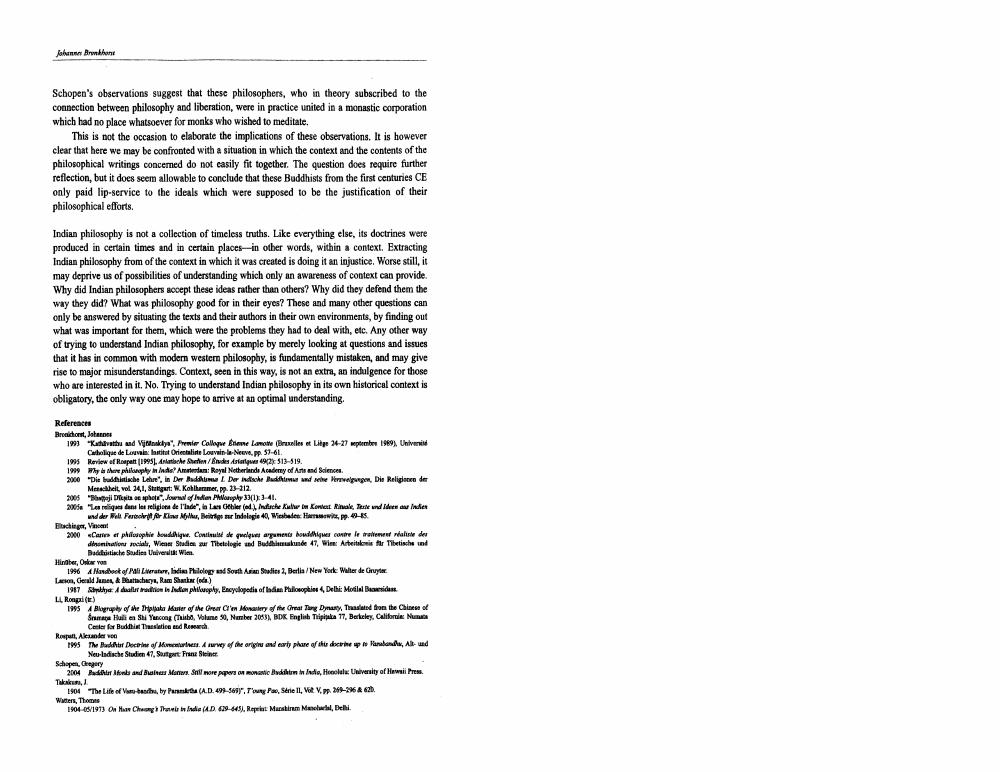Book Title: Context Of Indian Philosophy Author(s): Johannes Bronkhorst Publisher: Johannes Bronkhorst View full book textPage 8
________________ Johannes Bronkhorst Schopen's observations suggest that these philosophers, who in theory subscribed to the connection between philosophy and liberation, were in practice united in a monastic corporation which had no place whatsoever for monks who wished to meditate. This is not the occasion to elaborate the implications of these observations. It is however clear that here we may be confronted with a situation in which the context and the contents of the philosophical writings concerned do not easily fit together. The question does require further reflection, but it does seem allowable to conclude that these Buddhists from the first centuries CE only paid lip-service to the ideals which were supposed to be the justification of their philosophical efforts. Indian philosophy is not a collection of timeless truths. Like everything else, its doctrines were produced in certain times and in certain places--in other words, within a context. Extracting Indian philosophy from of the context in which it was created is doing it an injustice. Worse still, it may deprive us of possibilities of understanding which only an awareness of context can provide. Why did Indian philosophers accept these ideas rather than others? Why did they defend them the way they did? What was philosophy good for in their eyes? These and many other questions can only be answered by situating the texts and their authors in their own environments, by finding out what was important for them, which were the problems they had to deal with, etc. Any other way of trying to understand Indian philosophy, for example by merely looking at questions and issues that it has in common with modern western philosophy, is fundamentally mistaken, and may give rise to major misunderstandings. Context, seen in this way, is not an extra, an indulgence for those who are interested in it. No. Trying to understand Indian philosophy in its own historical context is obligatory, the only way one may hope to arrive at an optimal understanding. References Bronkhorst, Johannes 1993 "Kathavatthu and Vijfdnakiya", Premier Colloque Etienne Lamotte (Bruxelles et Liege 24-27 septembre 1989), Universite Catholique de Louvain: Institut Orientaliste Louvain-la-Neuve, pp. 57-61. 1995 Review of Rospatt (1995), Asiatische Shaien / Etudes Asiatiques 49(2): 513-519. 1999 Why is there philosophy in India? Amsterdam: Royal Netherlands Academy of Arts and Sciences. 2000 "Die buddhistische Lehre", in Der Buddhismus I. Der Indische Buddhismus und seine Verzweigungen, Die Religionen der Menschheit, vol. 24,1, Stuttgart: W. Kohlhammer, pp. 23-212. 2005 "Bhattoji Diksita on sphofa", Journal of Indian Philosophy 33(1): 3-41. 2005a "Les reliques dans les religions de l'Inde", in Lars Gohler (od.), Indische Kultur im Kontext. Rituale, Texte und Ideen aus Indien und der Welt. Festschrift fur Klaus Mylius, Beitrage zur Indologie 40, Wiesbaden: Harrassowitz, pp. 49-85. Eltschinger, Vincent 2000 *Casteet philosophie bouddhique. Continuite de quelques arguments bouddhiques contre le traitement realiste des denominations socials, Wiener Studien zur Tibetologie und Buddhismuskunde 47, Wien: Arbeitskreis fur Tibetische und Buddhistische Studien Universitat Wien. Hindber, Oskar von 1996 A Handbook of Pall Literature, Indian Philology and South Asian Studies 2. Berlin / New York: Walter de Gruyter. Larson, Gerald James, & Bhattacharya, Ram Shankar (eds.) 1987 Sarpkhya: A dualist tradition in Indian philosophy, Encyclopedia of Indian Philosophies 4, Delhi: Motilal Banarsidass. Li, Rongxi (tr.) 1995 A Biography of the Tripitaka Master of the Great Clien Monastery of the Great Tang Dynasty, Translated from the Chinese of Samapa Huili en Shi Yancong (Taisho, Volume 50, Number 2053), BDK English Tripitaka 77, Berkeley, California: Numata Center for Buddhist Translation and Research. Rospatt, Alexander von 1995 The Buddhist Doctrine of Momentariness. A survey of the origins and early phase of this doctrine up to Vasubandhu, Alt- und Neu-Indische Studien 47, Stuttgart: Franz Steiner. Schopen, Gregory 2004 Buddhist Monks and Business Matters. Shill more papers on monastic Buddhism in India, Honolulu: University of Hawaii Press. Takakusu, J. 1904 "The Life of Vasu-bandhu, by Paramartha (A.D. 499-569)", T'oung Pao, Serie II, Vot. V, pp. 269-296 & 62b. Watters, Thomas 1904-05/1973 On Yuan Chwang Travels in India (A.D. 629-645), Reprint: Munshiram Manoharlal, Delhi.Page Navigation
1 ... 6 7 8
